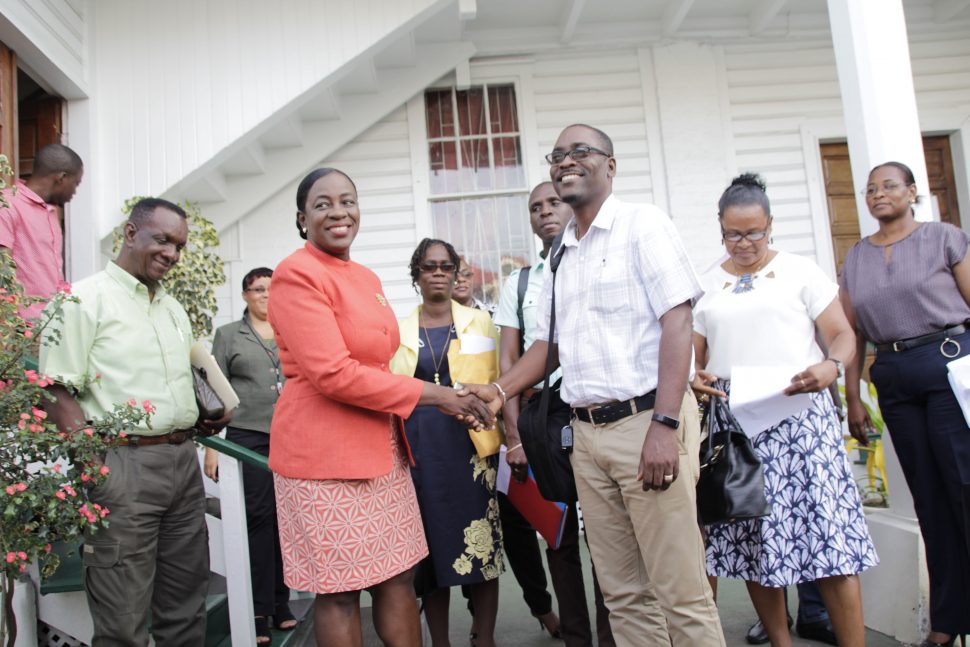After six hours of negotiation, the Ministry of Education (MoE) and the Guyana Teachers’ Union (GTU) yesterday struck a deal on salary increases for teachers for the period 2016 to 2018, with union reps accepting an across-the-board increase of 8% for this year.
For 2016, Minister of Education Nicolette Henry told reporters after the meeting, the parties have agreed to a tiered increase of 12% for junior teachers and 8% for senior teachers. There will be no increase for 2017 and the 8% increase for 2018 will apply across-the-board. The arbitration process, which was initiated following nine days of strike action by teachers nationwide, has therefore been aborted.
The 2016 to 2018 agreement will be signed in the new week, a joint statement from the MoE and GTU said. It said, “there was an amicable settlement for the matter not to proceed to arbitration.” The statement explained that “having considered the new information provided, which included salary benefits for all scales of teachers ranging from TS1 to TS19 and Special and non-salary benefits, the two parties concluded discussions and have committed to the implementation of the agreement.”
GTU President Mark Lyte expressed the belief that the union was able to broker an agreement that will bring satisfaction to all its members. He emphasised that particular attention was placed on ensuring the 80% of the sector, which operates between Teaching Service scales 1 to 4 (TS1 – TS4), are adequately compensated.
“We are walking away a lot happier…coming back to the table we feel now it will be more equitably received,” he said of the increases.
“Those who would have benefited from 10% will now have 12% and those who would’ve benefitted from 6% will now have 8%,” Henry noted.
Lyte indicated that the union forfeited 2017 increases as a “compromise” with the expectation that the 2016 increases will have a ripple effect.
However, neither the union nor the Ministry have stated what these numbers translate to in real figures. Information contained in the relevant national budget show that in 2015, a TS4 teacher paid at the highest end of the scale earned a gross salary of $108,437. A teacher at that same scale now earns $121,839 following a 6% increase to $114,943 in 2016 and further 6% increase in 2017.
Stabroek News has reached out to several members of the GTU negotiating team for clarification on the numbers but up to press time, none including Lyte and General Secretary Coretta McDonald could be reached.
The union has also agreed to accept $350 million to cover the cost of debunching for the period 2011 to 2018.
It is expected that payments for debunching and the 2018 increases will be made in December, while the retroactive 2016 increase will be paid in January, 2019.
Yesterday’s agreement was reached following a second intervention by President David Granger, who on Monday offered teachers a 10% hike for 2016 and an 8% hike for the current year.
The union has since 2015, been pursuing a five-year agreement for 2016 to 2020 but government has consistently refused to negotiate same. Yester-day’s agreement means the parties will have to return to the negotiation table next year.
It, however, also means that there will be no new strike action as threatened by the union executive last week.
Last October, President Granger, in an attempt to stave off strike action, set up a High Level Task Force which facilitated negotiations between the MoE and GTU. Although the task force included government representatives from all relevant ministries including the Ministry of Finance, government rejected its report. The report had recommended that government offer teachers a 40% increase on 2015 salaries.
Minister of State Joseph Harmon had told reporters that the report had grave financial implications and a source explained to Stabroek News that if government granted the increase recommended by the task force, it would cost some $4 billion.
President Granger himself deemed the report “deficient” and said that it should not be regarded as a sound basis for proceeding because critical information was not supplied to the committee.
Instead, government offered teachers a ballpark figure of $700 million to facilitate an increase in salaries based on the current salary scale, as well as a ballpark figure of $200 million to facilitate a de-bunching exercise for teachers for the new 2018/2019 school year.
Teachers, in response, engaged in a nationwide strike at the start of the new school term. The strike, which lasted nine days, was called off after the dispute was referred to arbitration. However, the union threatened to restart the strike after government unilaterally appointed as chairman of the arbitration panel, academic Leyland Lucas.
Lucas was arbitrarily selected by Minister in the Ministry of Social Protec-tion Keith Scott and rejected by the union who asked that he recuse himself.
The union had threatened that if within seven days, they and the MoE could not reach a consensus on a chair, then its members would return to the streets. The Ministry countered by warning teachers of consequences if they engage in strike action.






